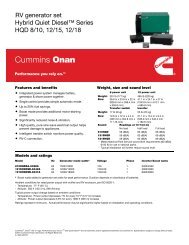Air Brake Manual
Air Brake Manual
Air Brake Manual
You also want an ePaper? Increase the reach of your titles
YUMPU automatically turns print PDFs into web optimized ePapers that Google loves.
Closing the control valve shuts off the supply<br />
of reservoir air pressure and exhausts the<br />
existing pressure in the spring parking brake<br />
chambers. This motion allows the spring to<br />
expand, applying the brakes.<br />
Spring Parking <strong>Brake</strong>s Applied<br />
<strong>Brake</strong>s On<br />
Mounting Bolts<br />
Service brake<br />
chamber<br />
Parking brake<br />
spring<br />
Slack<br />
adjuster<br />
Clevis and pin<br />
Dust<br />
cap<br />
Push rod<br />
Diaphragm<br />
return<br />
spring<br />
Diaphragm<br />
Spring parking<br />
brake chamber<br />
Caution: Parking brakes should be in the release<br />
position before making a service brake application.<br />
A full-brake application, made when the parking<br />
brakes are applied, can compound the force exerted<br />
on the slack adjusters and linkage and result in<br />
damage or brake failure. Compounding is the<br />
combination of two forces: the force applied by the<br />
spring brakes and the service brake.<br />
Spring brakes are primarily used as a parking brake,<br />
but in the event of loss of air pressure in the system,<br />
they can assist in stopping the vehicle. How quickly<br />
they will stop the vehicle depends on such factors<br />
as:<br />
· the weight and speed of the vehicle;<br />
· the steepness of the grade;<br />
· the spring force of the spring brakes that have<br />
been installed; and,<br />
· the adjustment of the service brakes.<br />
If the brakes have overheated, such as during<br />
mountain driving or hard highway braking, care must<br />
be taken when parking the vehicle. If the spring<br />
parking brakes are applied when the brake drum has<br />
expanded because of extreme heating, when the<br />
brake drum starts to cool and contract, the pressure<br />
exerted by the spring parking brake may cause the<br />
brake drum to crack or warp. When parking a vehicle<br />
with over heated brakes, park on level ground, stop<br />
the engine and leave the transmission in the lowest<br />
gear and block the wheels. Do not set the spring<br />
parking brakes until you have verified the brake drum<br />
is cool to the touch.<br />
34




